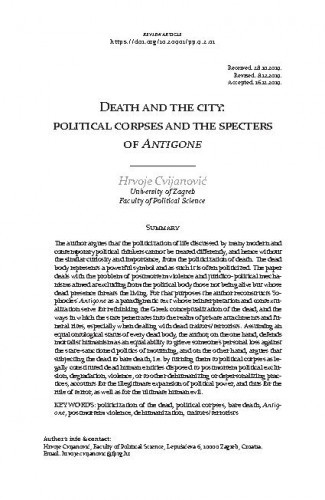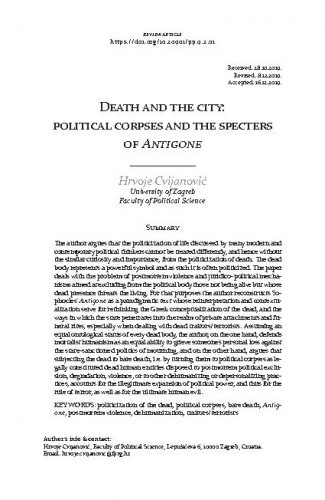The author argues that the politicization of life discussed by many modern and contemporary political thinkers cannot be treated differently, and hence without the similar curiosity and importance, from the politicization of death. The dead body represents a powerful symbol and as such it is often politicized. The paper deals with the problem of postmortem violence and juridico-political mechanisms aimed at excluding from the political body those not being alive but whose dead presence threats the living. For that purposes the author reconstructs Sophocles’ Antigone as a paradigmatic text whose reinterpretation and contextualization serve for rethinking the Greek conceptualization of the dead, and the ways in which the state penetrates into the realm of private attachments and funeral rites, especially when dealing with dead traitors/terrorists. Assuming an equal ontological status of every dead body, the author, on the one hand, defends mortalist humanism as an equal ability to grieve someone’s personal loss against the state-sanctioned politics of mourning, and on the other hand, argues that subjecting the dead to bare death, i.e. by turning them to political corpses as legally constituted dead human entities disposed to postmortem political exclusion, degradation, violence, or to other dehumanizing or depersonalizing practices, accounts for the illegitimate expansion of political power, and thus for the rule of terror, as well as for the ultimate human evil.; Autor tvrdi da se politizacija života, o kojoj govore mnogi moderni i suvremeni politički mislioci, ne može tretirati drugačije, a samim tim i bez sličnog zanimanja i važnosti, od politizacije smrti. Mrtvo tijelo predstavlja snažan simbol i kao takvo je često ispolitizirano. U radu se govori o problemu posmrtnog nasilja i pravno-političkim mehanizmima koji imaju za cilj isključiti iz političkog tijela one koji nisu živi, ali čija mrtva prisutnost prijeti živima. U tu svrhu autor rekonstruira Sofoklovu Antigonu kao paradigmatski tekst čija reinterpretacija i kontekstualizacija služi za ponovno promišljanje o grčkoj konceptualizaciji mrtvih, kao i o načinima na koje država prodire u domenu privatnih veza i pogrebnih obreda, posebice kad se bavi mrtvim izdajnicima/teroristima. Pretpostavljajući jednak ontološki status svakog mrtvog tijela, autor, s jedne strane, brani mortalistički humanizam kao jednaku mogućnost žalovanja nečijeg osobnog gubitka nasuprot državno određenim politikama žalovanja, a s druge, strane tvrdi da podvrgavanje mrtvih goloj smrti, tj. njihovim pretvaranjem u političke leševe kao pravno konstituirane mrtve ljudske entitete podložne posmrtnom političkom izopćenju, degradaciji, nasilju ili drugim dehumanizacijskim i depersonalizacijskim praksama, čini nelegitimno širenje političke moći, a samim time i vladavinu terora, kao i krajnje ljudsko zlo.
Sažetak

 Političke perspektive : časopis za istraživanje politike : 9,2(2019) / glavna urednica Ana Matan.
Političke perspektive : časopis za istraživanje politike : 9,2(2019) / glavna urednica Ana Matan.